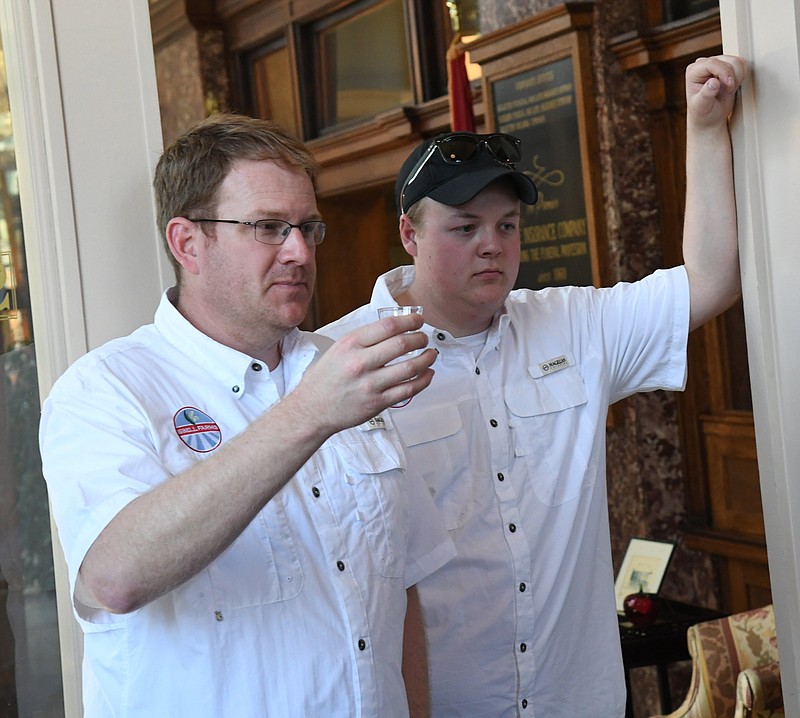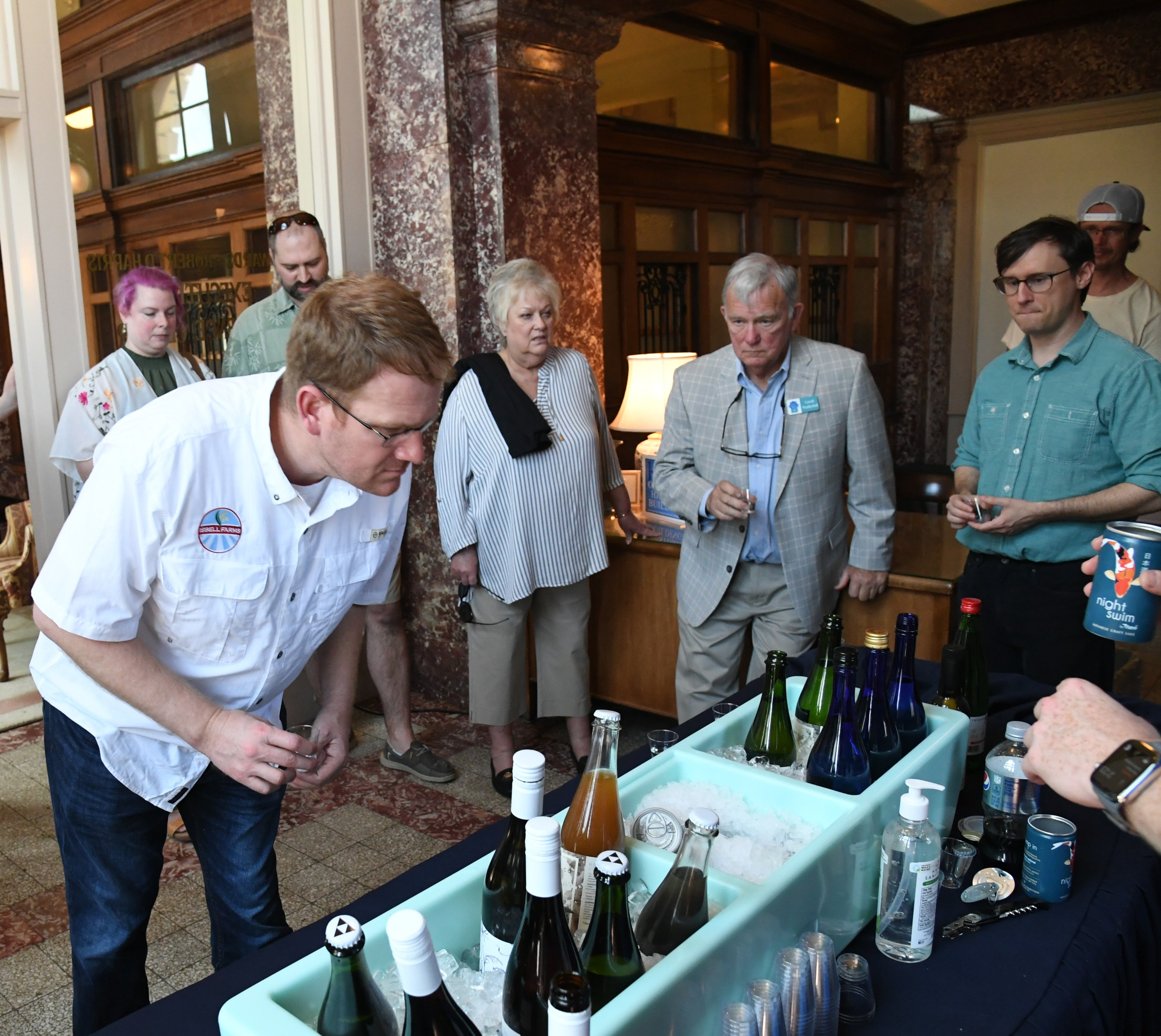EDITOR'S NOTE: This is the final installment of a continuing series on Arkansas' first sake brewery, which is being built in Hot Springs.
With decades of experience growing numerous types of rice, Isbell Farms will provide the product needed to brew sake for the Origami Sake facility being built in Hot Springs.
Isbell Farms was founded in 1945 in England in Lonoke County, when Leroy Isbell returned from serving in the Navy during World War II. While his father and grandfather were cotton farmers, Isbell decided to switch to growing rice, and his descendants have continued to grow rice for 75 years on the 3,000-acre farm.
Chris Isbell, co-owner of the farm, and Mark Isbell, Chris' son and a partner at the farm, recently spoke to The Sentinel-Record about their sake rice. Other partners at the farm include Chris Isbell's wife, Judy, Shane Isbell and Jeremy Jones.
"So we've been growing rice ever since my grandfather got back from World War II, so over 75 years now, and started in Japanese varieties, my dad did when I was just a kid back in the early, early '90s, and we've been growing sake rice for at least two decades, since the early 2000s," Mark Isbell said.
"My grandfather came back, and his dad had always grown cotton but a lot of the ground in our area is heavy clay and very suitable for rice. He got started in that, and, you know, the ground seems to want to grow rice so instead of fighting it, we do what it wants to do," he said.
Video not playing? Click here https://www.youtube.com/embed/HczYmGvZC8E
"There are probably six, maybe more than that, generations of farmers. The rice farming, my dad started when he got out of the Navy, World War II, so he started growing rice in '45, and then he bought more land and since then my wife and I bought more land, so I guess '45 (or) '46, we started growing rice, and, you know, I was born in '55, so I don't remember the beginning," Chris Isbell said.
For the first four and a half decades of rice farming, they didn't grow any kind of sake or Japanese rice, Chris Isbell said, noting that changed in the '90s when they decided to try to grow a sushi rice.
"We started growing a Japanese rice that had never been grown outside of Japan back in the early '90s, actually 1990, and so we grew that and got a lot of attention in Japan and a lot of media attention, actually, NHK, which is their public broadcasting, did a 90-minute documentary at that time on the farm, and we had all kinds of newspaper, magazine, television, all kinds of stuff," Chris Isbell said. "Even Judy and I were invited by the government of Japan to come visit the rice growing areas there, and it was kind of all this pleasant accident."
They were curious and discovered "this rice was supposed to be different from all other rices, so we wanted to see if it would grow in Arkansas," he said. "Anyway we started growing it here and it was actually a success so we sold it here in the United States to Japanese consumers and then the market opened up to go to Japan and we were able to sell our product with our picture on the bag in Japan, this was all in the '90s."
The success with this Japanese rice led the Isbell family to Yamada Nishiki, a sake rice, but their early experimenting with sake rice didn't yield promising results, Chris Isbell said.
"From that, we started looking at other Japanese varieties, just out of curiosity again. We grew one of the sake varieties. We were just growing it to look at the possibility that it would grow here. We tried a lot of different Japanese varieties and this one happened to be the No. 1 sake rice in Japan and so we grew it, looked at it and it wasn't too agronomically feasible," he said.
"It was tall and didn't yield ... half as much as the standard varieties of the United States are, but anyway, we kept the seed and then out of the blue a sake company in Berkeley, Calif., Takara, which is the largest sake brewery in the United States, and Japanese owned, they called and asked if we had the variety, and we did, and so they wanted us to start growing it and we grew it about five years, and they were doing tests with it, then they decided to release their product and started selling it to high-end restaurants, and we still sell to them today, but since that time we've started selling to other breweries, even outside the United States," Chris Isbell said.
The sake type of rice is difficult to grow, Mark Isbell said. "For one, it does not yield as well as the regular varieties that we produce for the grocery store markets, and it is much more susceptible to lodgings, so it blows down.
"It's really tall, and so it's very difficult to harvest and we also like to pay very close attention to make sure that we're growing it in such a way that the quality will be very good, so we're focused on making sure it's not just about quantity but also quality."
The quality of the sake rice, Chris Isbell said, is well known in Japan.
"They have a sake brewing contest, a sake contest in Japan ... they have separate competitions. The other rice don't even compete with Yamada Nishiki, it has its own category and it brews the, supposedly, the best sake in the world, and there are a number of companies that use it for their highest quality sake, and we were growing that and continue to grow that now," he said.
About 1o years ago, Chris Isbell was contacted by Ben Bell, who has since become vice president of Origami Sake. Ben Bell and Matt Bell, CEO and owner of Origami Sake, are currently working to open the Hot Springs-based sake company.
Both Chris and Mark Isbell said they are hopeful for the project to be a success.
"We have always hoped to see something like this come to light and are excited that it finally is, yeah, couldn't be more excited to see Ben Bell and Matt Bell working together to make it a reality, so we're confident that it'll be successful," Mark Isbell said. "We're excited about the support we saw from the people of Hot Springs during the Cherry Blossom Festival and, yeah, rice is a huge part of Arkansas' economy and culture."
He said 50% of the rice grown in the United States is grown in Arkansas and "we're excited now that sake, which is a very important part of rice as it relates to Japanese culture, is now also going to be created here in Arkansas. We're excited to see it grown in our backyard and brewed at out back door basically."
"They're really intent on making this happen. We've visited their building, even just recently, and they've got it going on. They're going to be a success or I'm really wrong. They're go-getters," Chris Isbell said.
"I think it's really cool to see this taking place in Hot Springs, where there's a great community, a great history of quality water and, you know, it's like all the pieces that have always been there along with the rice that we've been growing, the water that Hot Springs can provide, the expertise that Ben can bring and then the business experience that Matt can bring, it's like all the pieces are finally coming together, and it's exciting to see that," Mark Isbell said.
"I like that, with the new thing of farm-to-table, you know, I guess it's farm-to-bottle," Chris Isbell said.
Matt and Ben Bell said they intend to have sake for sale by the end of this year and Mark Isbell said the farm will soon start growing this year's sake rice crop.
"So we'll be planting here in the next few weeks and we harvest in, you know, September, October, November, depending on what the weather has in store for us, yeah, spring to fall," he said." We will definitely have product available for whenever they need it."

